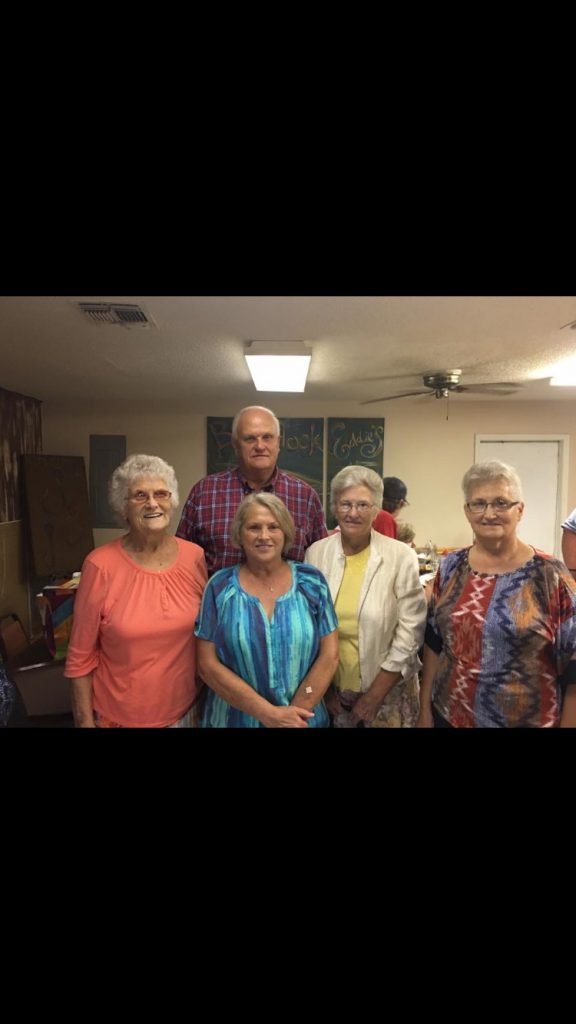
Early life
Pal “Buck” Beasley was born in 1947 in Millry, Alabama as twelfth of thirteen children, and he was the baby boy of the family. When asking Mr. Beasley, and many of our family members how he got the nickname “Buck” no one could give a concrete answer, but it stuck nonetheless. Mr. Beasley graduated from Millry High School, and immediately began to work for Ciba-Geigy. The company at the time was one of the biggest producers of DDT, so even before Mr. Beasley’s involvement in Vietnam he was working with hazardous materials.
The Draft
In 1967 Mr. Beasley received his draft notice in the mail. He took a bus to Montgomery, Alabama to take a physical, and within the next few months they mailed him a draft credence. Mr. Beasley got back on a bus in Chatom, Alabama and went to Montgomery again. The healthy young men were put on another bus and sent to Fort Benning, Georgia for eight weeks of basic training. Once basic was completed they were sent to Fort Polk, Louisiana for jungle training. After nine weeks of jungle training Mr. Beasley got a fifteen day leave. He came home for a couple of weeks, and then got on a bus and rode all the way to California. Mr. Beasley had never been on a plane before, and now he was flying across the Pacific to Vietnam. That was the story of many men that left to fight in Vietnam, and sadly during the years Mr. Beasley was there a lot of those men wouldn’t return alive.
Early Vietnam

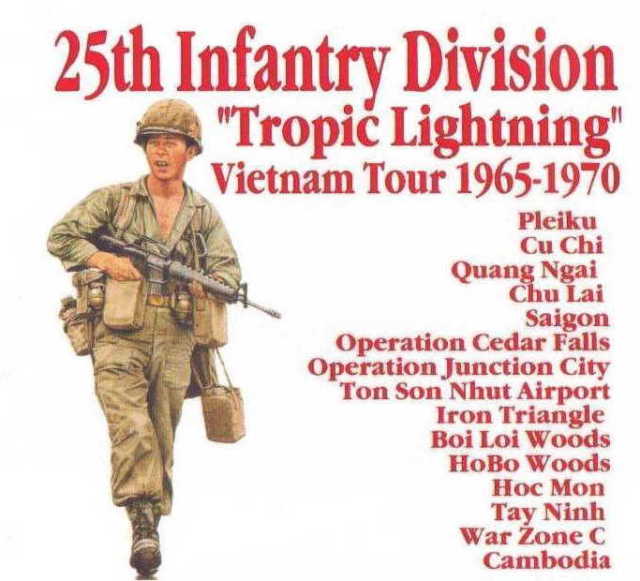
Once Mr. Beasley arrived they placed him in the 25th Infantry Division, 4th and 23rd Mechanized Unit. After two more weeks of jungle training in Vietnam they put him on patrol through the jungle. They stationed him in Cu Chi for a few months, and then they moved him to Tay Ninh for the remainder of the tour. One day while on patrol Mr. Beasley was riding on top of an APC when they were hit by a rocket. Mr. Beasley recalls, “We couldn’t ride in them, we had to set on top of them, and it exploded, and it actually blew one, two, three, three of us on back where the hole comes up through it, and it blew us off of it, off the top of it. I don’t know if you want me to tell all this or not, but the one on the opposite side, he didn’t die right then, but it killed him. And that one in the middle I never did see him no more, and they didn’t tell us anything. So actually, I know he died on the spot, and I never did know about him…. The driver, he got out at the front of the APC, I don’t know if you’ve ever seen one or not but they are on the tracks, you’ve probably seen them. And he got out to help us and they shot him twice, and about that time they shot another one. It’s got a 50 caliber on top of it and they shot it and knocked completely off, and the helicopters came over and they saw us. Some way or another the radio man called and finally, the rest of the company got around to where we were at and set up around us. They came in there and got us. That’s on the day I got wounded.” Mr. Beasley’s life would never be the same after this point. He talks about how he doesn’t remember anyone’s name that he was in Vietnam with. He explains how it wasn’t worth remembering names at a certain point. When questioned about that, Mr. Beasley said I do remember some of the name from basic training, but not one person from Vietnam.
Hospital Life
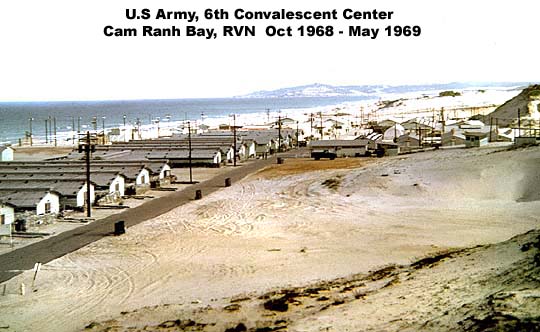
They flew Mr. Beasley to Cam Ranh Bay to the hospital where he could be treated for his wounds. They removed shrapnel from his back, stomach, arms, and feet. He ended up getting 116 wire stitches throughout his body. While in the hospital he believes they gave him too much medicine or used a bad injector gun because while healing from the rocket wounds he got hepatitis. The hepatitis kept him in the hospital for an extra month. While he was in the hospital an exchange between the doctor and the company commander occurred. Mr Beasley said, ” I heard the doctor say, ‘you gone send this boy back to the states?’, and lord I was praying that they would send me back to the states. Then he said oh no we need him over here, just patch him back up.” Four months after getting 116 wire stitches Mr. Beasley was back in the jungle on search and destroy patrols.
Vietnam Post Wound
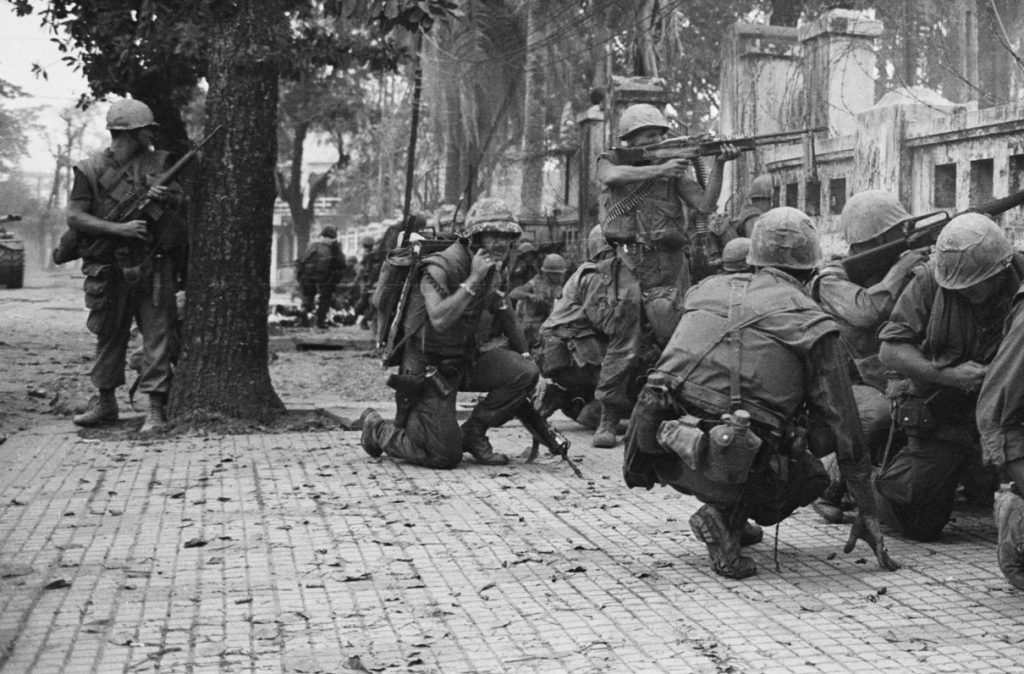

Mr. Beasley explains how his mentality shifted after being wounded. Before, he said not much would scare him, but after someone could say boo and he would jump. He recalls a few more close calls. Mr. Beasley said, “One time we were kind of in a search and destroy mission and we were going through this thick jungle and I was on the side of the APC with a machine gun, and the driver really couldn’t see where he was going but he went over and fell into a big hole and throwed me off and it hit that thing and I was just lying on the side of it, if it would’ve twisted over it would have been on top of me. That was another close call I got.” He also remembers a specific day where they had to go through a village which they believed rockets were coming from. He recalls, “I’ll never forget we were going through for search and destroy, and I saw a little youngin’ laying down there in a ditch and I don’t know, I just went on by it I guess. We just left it there. I always wondered about that. I should’ve got him, but you just don’t know. They booby trap stuff like that so I just kept going and we went on through the village checking it our trying to find where the rockets came from. That’s, like you say, I had a lot of close calls but I’m a blessed man.” Mr. Beasley explained that he was over there during the Tet Offensives and they would have to go into Saigon, and Tan Son Nhut air base. It was their job to set up perimeters in the city, and thats when a lot of people were killed. He said that his infantry never shot unless they were shot at, and that everyone he was around was good about following those orders. He said they used to love hearing the U.S. planes come over because they knew there was going to be an airstrike which helped their chances of survival while on search and destroy missions. Several months went by after he got out of the hospital, and about seven days before being over there a year they flew him and many others back to the states.
Daily Routine
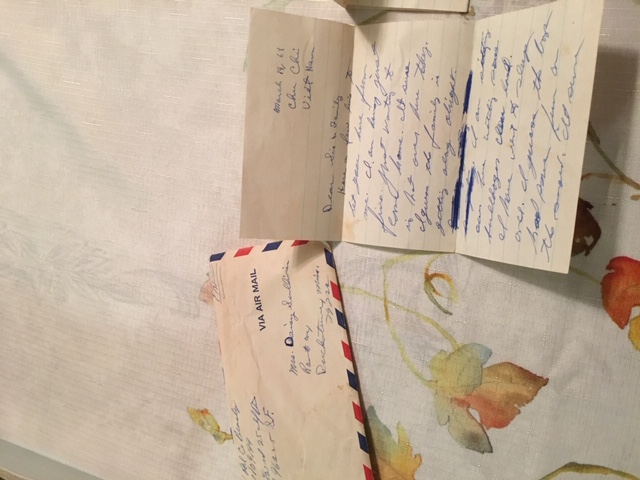
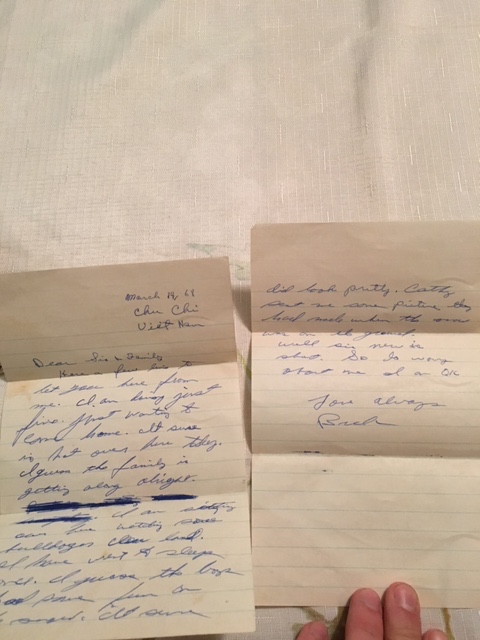
Mr. Beasley was out in the jungle for weeks and sometimes months at a time before returning back to the base. While they were out there he said they would just walk beside or ride on the APC units and they carried an M-16. They survived on C-rations that they would try their best to soup up. Mr. Beasley said every night they would do the same things, first they would find a place to settle down and set up a perimeter with Claymores surrounding them, and he said a few times he remembers the VC coming up and turning the Claymores around on them. On the rare occasion they would return to base camp they would unpack and get a hot shower, and sometimes within the next few hours they would be out in the jungle again. Mr. Beasley always wrote letters back home to his family and his girlfriend (now his wife). During this time as well Mr. Beasley was involved in the Tet Offensives. He said those were some of the more draining times of his service. The Tet Offensive was one of the largest military campaigns that were launched by the Viet Cong. The surprise attacks on enemies and civilians alike triggered a time of desperation in the conflict.
Back in the States
Near the fall of 1968 they flew him back to the States into LAX, where Mr. Beasley’s sister, Bernice was living at the time. She picked him up, and he stayed with her for a few days before flying back home. He said that they had standby tickets for cheap, but he wasn’t waiting so he got a first class ticket on his flight home, and didn’t think twice about it. After his thirty day leave, they stationed him in Washington state to train others. Mr. Beasley was an AI on a M-16 range, and he said they taught classes at night. He explained how that was just like a regular job, and once he completed his two years of service he went right back to Ciba-Geigy. Mr. Beasley said they held his position and he didn’t lose any seniority when he returned. They also counted his years of service toward his retirement. While working he went to community college at night on the GI Bill. During that time he got married and started a family. Mr. Beasley said that if a four year college was closer he would’ve went, but he couldn’t pick up and move his family just to finish his degree when he already had a good job with Ciba-Geigy.
Mr. Beasley’s wife also said that he struggles with PTSD, but it has gotten better. Mr. Beasley did not seem to want to bring up his struggles with PTSD, which might be because I am his nephew or because he is more private. There are many reasons as to why someone wouldn’t want to disclose information like that. I am aware the my Uncle Buck has always been a more private man. To me, he has always been the ideal man’s man. He went to Vietnam is the deadliest years of the war, and to come out of the other side is alive is a magnificent feat. After the interview concluded Mr. Beasley continued to reiterate how he is a blessed man, and I would have to agree with that.
Analysis
Mr. Beasley was in Vietnam in two of the deadliest years of combat. His involvement in the Tet Offensive gives insight to the significant amount of attacks that occurred during the early months of a politically charged year, 1968. How quickly Mr. Beasley was wounded while patrolling the dense Vietnamese jungle with the 25th Infantry proves that Vietnam was a dangerous place, and there was always the chance that the Viet Cong were right around the corner. Or, at any moment you could step on a land mine and be blown away. Mr. Beasley was at times, literally entrenched in a deadly war, with bullets whizzing over his head, and a M-16 out of reach. The thought of a young man from the family community of Red Creek, Alabama, who had never ventured out of Alabama, except to go to Mississippi, was now involved in a war over 9,000 miles away from all he had ever known. The courage and strength it must have taken to accept the duty to serve the country in possibly the most controversial war in modern history is more than admirable. The strength to take 116 stitches and continue the fight shows the pure toughness of a young man. Mr. Beasley contributed to an effort that has been ridiculed tremendously over time, and his words are steadfast; “I’m a blessed man”. Mr. Beasley can say that, because he made it out alive, unlike many others. Regardless of the circumstances Mr. Beasley, my Uncle Buck, is alive, and no matter the struggles he still has a loving family. He has a wife of over 40 years, and many wonderful grandchildren. The significance of Uncle Buck’s time in Vietnam is that he lived to tell the story, and carry on his legacy through his family. He is, in fact, a blessed man.
Transcript
file:///Users/brae_sullivan12/Downloads/Transcript.pdf
Additional Readings
https://www.npr.org/2016/04/07/473339367/veterans-groups-fight-stigma-associated-with-hepatitis-c
https://www.history.com/topics/vietnam-war/tet-offensive
Willbanks, James H. “MOTIVATIONS AND OBJECTIVES OF THE TET OFFENSIVE.” In The Tet Offensive: A Concise History, 89-92. Columbia University Press, 2007. http://www.jstor.org/stable/10.7312/will12840.14.
Willbanks, James H. “THE IMPACT OF THE TET OFFENSIVE.” In The Tet Offensive: A Concise History, 66-78. Columbia University Press, 2007. http://www.jstor.org/stable/10.7312/will12840.12.
Wheeler, James Scott. “The Vietnam War and the Big Red One: Deployment and First Battles.” In The Big Red One: America’s Legendary 1st Infantry Division Centennial Edition, 1917-2017, 382-416. Lawrence, Kansas: University Press of Kansas, 2017. http://www.jstor.org/stable/j.ctt1pv8925.22.
Prados, John. “Terrible Swift Sword (1968–1969).” In Vietnam: The History of an Unwinnable War, 1945-1975, 256-87. Lawrence, Kansas: University Press of Kansas, 2009. http://www.jstor.org/stable/j.ctt1h64p60.17.